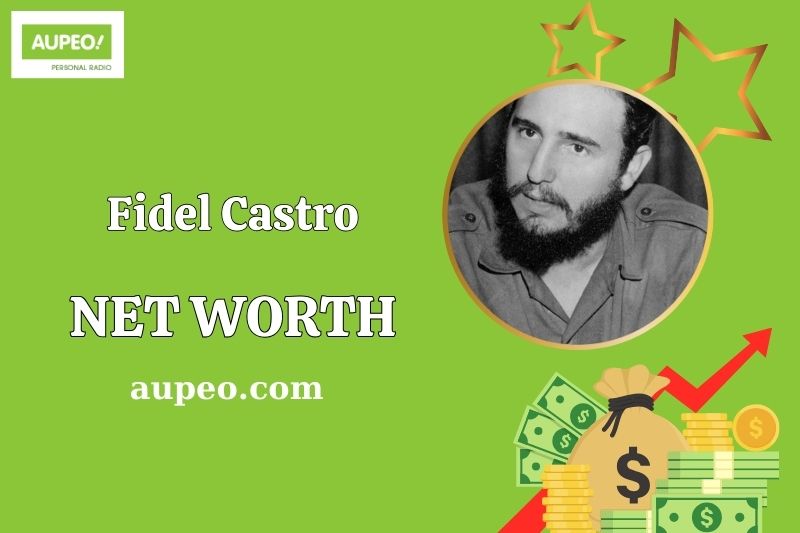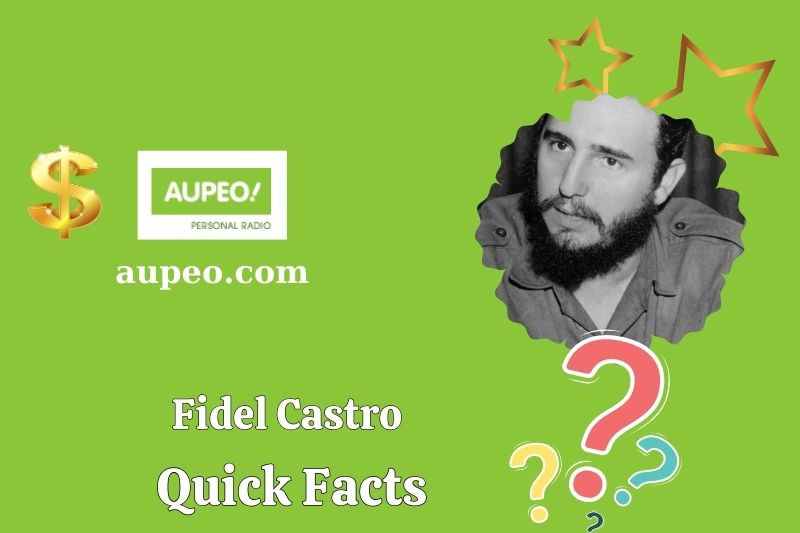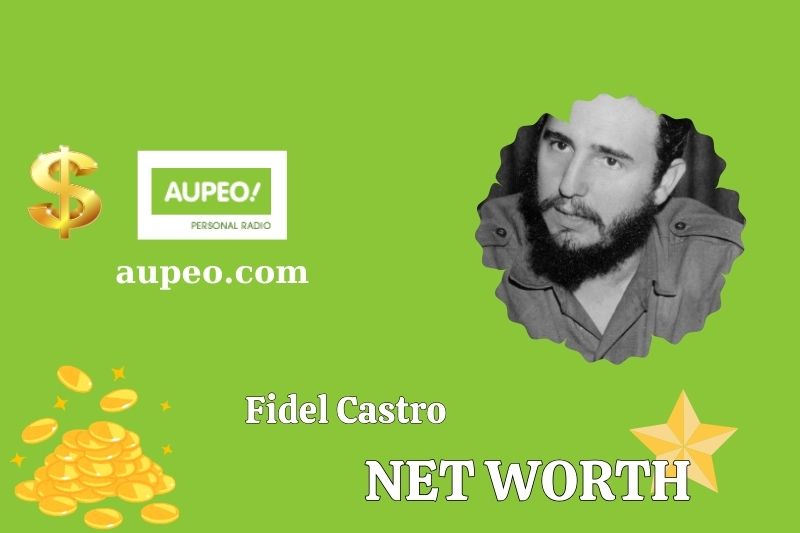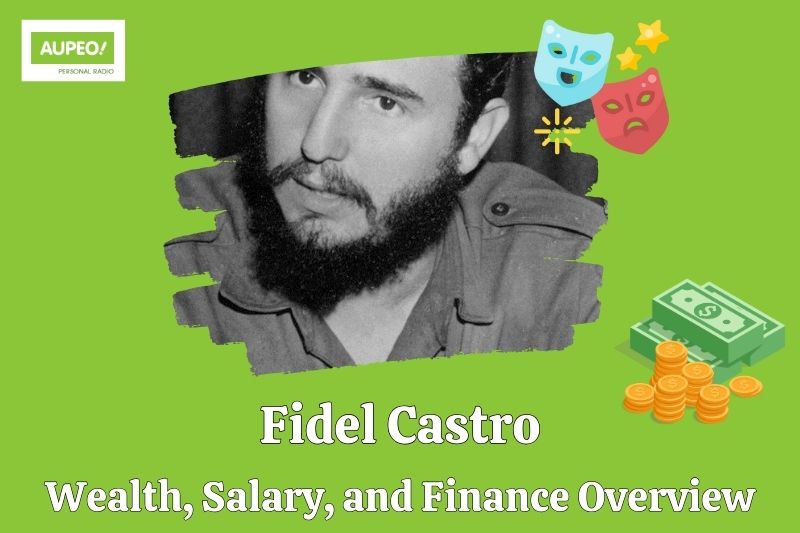
The purely value of Fidel Castro has been the subject of intrigue for years. As a Cuban revolutionary leader, he controlled the nation with huge resources, but his wealth is largely hidden from the public’s eye.
Although many consider its sacred value as the expansion of its political power, others argue that it is a reflection of the secret nature of his regime.
In this article, we will deeply understand Fidel Castro’s wealth, salary and financial review, study how he accumulates his fate, his sources of income, and his financial heritage.
FIDEL CASTRO Quick Facts

| Fact | Detail |
|---|---|
| The real name | Fidel Alejandro Castro Ruz |
| A popular name | Fidel Castro |
| Date of birth | August 13, 1926 |
| Age | 90 (deceased on November 25, 2016) |
| Birthplace | Birin, Orientes Province, Cuba |
| Nationality | Cubic |
| Ethnicity | White (of Spanish origin) |
| Education | Quality of Law from Havana University |
| Marital status | Twice married |
| Wife | Dalia Soto Del Valle (M. 1980–2016), Mirta Díaz-Balart (M. 1948–1955) |
| Children | 9 Baby |
| Introduction | Natalia Naty Revelta Clews (Case) |
| Brothers | Raul Castro (brother) and others |
| Parents | Ángel Castro Y Argiz, Lina Ruz González |
| Height | 1.91 m |
| The sacred is worth | Rated for $ 900 million |
| Source of wealth | Politics, revolutionary leadership |
What is the net value of Fidel Castro in 2025?

The purely value of Fidel Castro is the theme of speculation in 2025, as most of his wealth was hidden throughout his life. At his death, his assets were estimated at $ 900 million. This was the result of its control over state -owned enterprises, Cuba and its secret investment.
Castro’s wealth is still a matter of secrets, as most of its financial deals are staffed by the Cuban government.
Here are some related figures, both allies and rivals who have also had a significant political impact on their period:
- Raul Castro
- Che guevara
- Fulgencio Batista
- Union
- United States
- Hugo Chavez
- Nicolas Maduro
- Cuban government
- Marxist movements
- Latin American leaders
For the updated list of the richest celebrities, look at this textbook.
Fidel Castro wealth, salary and financial review

Fidel Castro’s role in Cuba’s economy
Fidel Castro was not only the form of the Cuban Revolution but also its economic architect. As soon as the power was seized, Castro nationalized most of the Cuban industries, which effectively brought them under state control. This has had a huge impact on the wealth of the country.
Although it is difficult to determine how much Cuban’s wealth was in Castro’s personal accounts, his leadership has given him control over huge resources, which eventually created his financial situation.
Under the Castro regime, the Cuban economy was largely dependent on state enterprises. Control of the state of agriculture, tourism and production sectors meant that Castro had significant control over the Cuban financial outcome. However, economic ineffectiveness and limited growth of the US embargo, which is difficult to make Castro’s personal wealth in power.
His government’s salary
Fidel Castro’s salary was publicly aware that he was modest compared to his wealth. As a prime minister and president, his public remuneration was imposed by the Cuban government, but it was a small part of his total wealth. Castro’s personal wealth was not directly related to his official salary; Instead, his financial position influenced his political power and control over the Cuban economy.
In fact, some reports suggest that he has not received a salary for many years. Instead, Castro’s wealth was likely to be built by its dominance to the Cuban economy, including state -owned resources and investments.
Fidel Castro’s income sources
Although it is difficult to verify the exact figures, Castro’s wealth originated primarily from its political leadership. Controls of Cuban state -owned enterprises, agricultural production, and resources such as oil and tobacco helped him with significant wealth. In addition, his alliance with the Soviet Union provided Cuba with significant financial and military assistance, which would support his financial power.
Castro also had access to various assets in different sectors, including tourism, real estate and possibly foreign accounts. Despite his anti-capitalist position, the revolution enabled him to create a complex network of financial interests that participated in his personal wealth.
The role of foreign relations in its wealth
Castro’s financial situation was significantly formed by his foreign relations, especially with the Soviet Union. The USSR has provided economic assistance to Cuba, which is less dependent on the capital of the West. At the same time, its conflicts with the United States, including the invasion of the Cuban rocket crisis and the ears of the pigs, led to an economic embargo that isolating Cuba from global markets.
However, Castro was able to maintain Cuban’s financial situation with the development of relations with other Marxist governments and third world countries, providing resources that were crucial for both his personal finances and the economic survival of Cuba.
Her real estate holding
Fidel Castro real estate assets are also noteworthy. He was known to control a variety of property in Cuba, from luxury estates to agricultural land. Its influence also spread to the Cuban coasts, speculations that it had the property in places such as Switzerland. However, these assets have never been fully disclosed, causing rumors about his wealth.
Although the Cuban government has never provided the official list of Castro’s ownership, it is clear that its wealth is much higher than it has received beyond public salary, making it one of the richest leaders in history.
How Castro managed to make his wealth in the wake of international inspection
Although he led the country with an open socialist system, Castro managed to hide his wealth. Although publicly abandoned capitalism, it enjoyed many benefits of capitalist economy. His wealth was hiding for the close control of the Cuban government’s financial statements. Many people believe that he has used offshore accounts, shell companies and other financial instruments to protect his assets from checking.
Public reactions to Castro’s wealth
Castro’s wealth was often suspected, especially given his socialist belief. Critics claimed that he was a hypocritical, with a great fate maintaining the ideals of equality and anti-capitalism. In turn, his supporters argued that his wealth was not only a personal but also a product of his influence in the formation of the Cuban economy. Finally, Castro’s financial heritage remains a controversial point.
Conclusion
Fidel Castro’s purely value remains one of the most enigmatic themes of his legacy. His control through the Cuban economy and state -owned enterprises has made his financial history fascinating.
GEA – Video Clip invites you to share the views, comments, or questions below, or study more articles about finance and celebrities at GEA – Video Clip.com.



